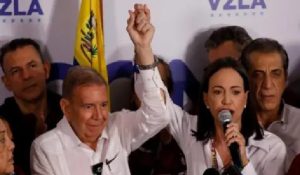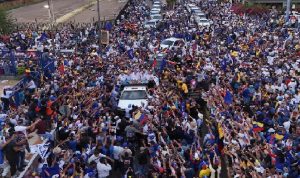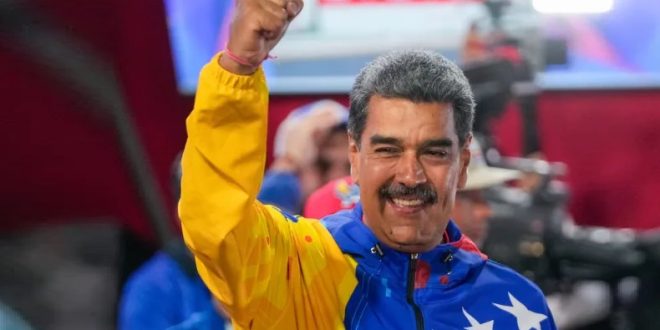30-07-2024
CARACAS: President Nicolas Maduro has won Venezuela’s presidential election, according to partial results announced by the electoral council.
The head of the National Electoral Council (CNE), Elvis Amoroso – who is a close ally of Maduro said that with 80% of ballots counted, President Maduro had 51% of the vote, compared to 44% for his main rival.
 The Venezuelan opposition dismissed the CNE’s announcement as fraudulent and promised to challenge the result.
The Venezuelan opposition dismissed the CNE’s announcement as fraudulent and promised to challenge the result.
It said its candidate, Edmundo González, had won with 70% of the votes and insisted he was the rightful president-elect.
The opposition said vote tallies it had received, as well as quick counts, showed González had a lead of 40 percentage points over the incumbent.
Opposition parties had united behind González in an attempt to unseat President Maduro after 11 years in power.
Opinion polls conducted ahead of the election had suggested Gonzalez would roundly defeat the president.
The result of the election will have repercussions well beyond the South American country of 29.4 million inhabitants.
Over the past 10 years, 7.8 million people have fled Venezuela because of the economic and political crisis into which the country was plunged under the Maduro Administration.
Polls conducted in the run-up to the election suggest that exodus could now increase, with one poll suggesting a third of the population would emigrate.
With immigration a hot topic in the US election, the government in Washington, as well as Latin American nations to which Venezuelans have emigrated en masse, are affected by what happens in the Andean country.
Who Venezuela does business with also matters because it has the world’s biggest oil reserve.
Maduro blames US sanctions for his country’s economic woes and has forged close alliances with China, Iran, and Russia – nations which also have a thorny relationship with the US.
 A change of government could see Venezuela turn away from these countries as well as from its close ally, Cuba, while Maduro is expected to deepen his ties with his allies should he stay in power.
A change of government could see Venezuela turn away from these countries as well as from its close ally, Cuba, while Maduro is expected to deepen his ties with his allies should he stay in power.
Many Venezuelans were adamant that they wanted change after 25 years in which the socialist PSUV party has been in power – first under the leadership of the late President Hugo Chávez, and after his death from cancer in 2013, under Nicolas Maduro. In the queue at one polling station in Petare, a poor neighborhood in the capital, Caracas, many people said they were voting for “change”.
“This government has had all the opportunities to make Venezuela a great country, but instead we have misery,” Hector Emilio D’Avila told media.
“Our children have to go through a jungle, the Darién Gap, to the US. There are many dead Venezuelans in the jungle. Our children are dying.”
There was widespread fear that the government could resort to fraud to win the election. Maduro’s win in 2018 was also widely dismissed as neither free nor fair.
However, the opposition had hoped its lead would be so convincing, it would thwart any attempts by the Maduro administration to “steal the election”.
One community leader, Katiuska Camargo, said for many years people did not turn out in such large numbers because “there was so much collective disappointment” but that now people were “determined that these people leave power immediately”. (Int’l News Desk)
 Pressmediaofindia
Pressmediaofindia




